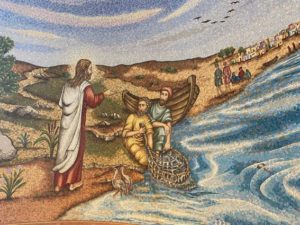Three cultures coexist in Israel at the time Jesus is born in Bethlehem of Judea. On the one hand, are the people of Israel, a civilization that has existed for 1,800 years. It originates with a group of nomads beginning with Abraham and which, guided by Jehovah, is taken from slavery in Egypt towards the promised land. It is the only monotheist population of its time.
Additionally, there are two great cultures: Greek and Roman. The first boasts cultural supremacy and the latter is the top military and economic power on earth. Both are polytheist, but socially they discard the weak, and they use the poor for servile or humiliating jobs.
It is the Apostles who will bring to the three cultures a new way of understanding man, work and society which will quickly expand throughout all nations. The rapid growth of Christianity despite persecutions suffered by Christians, is humanly supported by the impact derived from its example and preaching.
They preach One who is Crucified, and they distinguish themselves by caring for the weak: widows and orphans. The Acts of the Apostle tell that story. The Christians are those who will subsequently take care of others similarly to themselves.
But there is an additional meaning underlying the preaching of Jesus Christ, and which will affect all three cultures: the Christian meaning of work.
The Apostles were Israelites of their time, the majority were fishermen, others had different professions such as Matthew, a Tax Collector; some were more educated than others, such as John, who personally knows the High Priest. Later we will meet Paul of Tarsus, a Pharisee who has studied at the school of Gamaliel, and who is a tentmaker by trade. All of them left their work to become “fishers of men” and became members of the Apostolic College.
Nevertheless, the early Christians already have a specific sense of work that is different and distinguishable from that of any other culture or religion. They are citizens of the world who know themselves to be protagonists of history and creation, and to be entrusted with caring for the Garden of Eden, which has been freely given to them. And they understand work as a redemptive offering. It is their means of sanctification.
Who taught them this new message? The Apostles, no doubt. But the Apostles had grown up with the local knowledge of Galilee.
Then, who taught the Apostles this new message? He who spent more than twenty years working hard under the tutelage of Joseph, his earthly father, and who was known as the son of the τέκτων (a Greek translation of the Hebrew term קָשֶׁה – harash – or nagar in Aramaic). Joseph taught his son the skills of a good tekton.

Magdala Tourist Center, Duc In Altum
But if that is the case, who taught Joseph such a distinguished trade in a city as small as Nazareth?
A possible solution to this puzzle is Joseph’s father, Jacob, who moved from Bethlehem to Galilee in order to work in Sepphoris, which is about six kilometers from Nazareth. (*)
It is Jesus who, living in Nazareth and working a few years as a nagar in Sepphoris, gave a new meaning to human work: a divine meaning.
By Domingo Aguilera Pascual
Creator of the blog – www.amigosdelavirgen.org and author of “The Relatives of Mary” and “The Relatives of Joseph.”
———————————————————————————————————
(*) This hypothesis is held by several contemporary Josephine theologians, who base themselves on the most recent archeological discoveries in Sepphoris to reach this conclusion (cf. “Alfonso Gómez Fernández. Tras las huellas de José. Biblioteca de Autores Cristianos. Madrid 2021”).
Note: τέκτων is related to the Greek work τεχνίτης (technique) and its English translation, artificer, means a skilled craftsman, architect, or one who utilizes tools in his work. It is not merely a manual task. Its meaning is closer to architect than to carpenter. In fact, Jesus speaks many times about rocks and buildings as someone who is versed on the subject. Also he said “if they do these things to the greenwood, what will be done to the dry? – making mention of wood.
